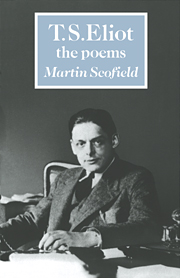Book contents
- Frontmatter
- Contents
- Acknowlegements
- Chronology
- Introduction
- 1 Aspects of the life of the poet
- 2 Early poetic influences and criticism, and Poems Written in Early Youth
- 3 Prufrock and Other Observations (1917)
- 4 Poetic theory and poetic practice
- 5 Poems (1920)
- 6 The Waste Land (1922)
- 7 From The Hollow Men (1925) to ‘Marina’ (1930)
- 8 Poetry, pattern and belief
- 9 From Coriolan (1931) to ‘Burnt Norton’ (1936)
- 10 ‘Burnt Norton’ (1936) and the pattern for Four Quartets
- 11 The wartime Quartets (1940–2)
- Notes
- Select bibliography
- Index
Introduction
Published online by Cambridge University Press: 18 January 2010
- Frontmatter
- Contents
- Acknowlegements
- Chronology
- Introduction
- 1 Aspects of the life of the poet
- 2 Early poetic influences and criticism, and Poems Written in Early Youth
- 3 Prufrock and Other Observations (1917)
- 4 Poetic theory and poetic practice
- 5 Poems (1920)
- 6 The Waste Land (1922)
- 7 From The Hollow Men (1925) to ‘Marina’ (1930)
- 8 Poetry, pattern and belief
- 9 From Coriolan (1931) to ‘Burnt Norton’ (1936)
- 10 ‘Burnt Norton’ (1936) and the pattern for Four Quartets
- 11 The wartime Quartets (1940–2)
- Notes
- Select bibliography
- Index
Summary
This study attempts to approach Eliot's poetry in the spirit of his own remarks about his first reading of Dante, in his essay of 1929. He says there that he has always found an elaborate preparation of scholarly knowledge a barrier in approaching a poet's work; or that at least ‘it is better to be spurred to acquire scholarship because you enjoy the poetry, than to suppose that you enjoy the poetry because you have acquired the scholarship’ (Selected Essays, p. 237). Nevertheless he goes on to say that an initial response to the poetry will lead the reader naturally to want to know more and penetrate deeper: ‘if from your first deciphering of it there comes now and then some direct shock of poetic intensity, nothing but laziness can deaden the desire for fuller and fuller knowledge’ (p. 238). So the present study assumes that the reader will have read at least some of Eliot's poetry and that his or her interest has been sufficiently stimulated to want to look into it more deeply, to find some account of how the poems work on the reader, and to gain a more conscious understanding of the poems. It tries to give an account, that is, of what it is we enjoy in the poems, and of the significance of that enjoyment.
- Type
- Chapter
- Information
- T. S. Eliot: The Poems , pp. 1 - 8Publisher: Cambridge University PressPrint publication year: 1988



